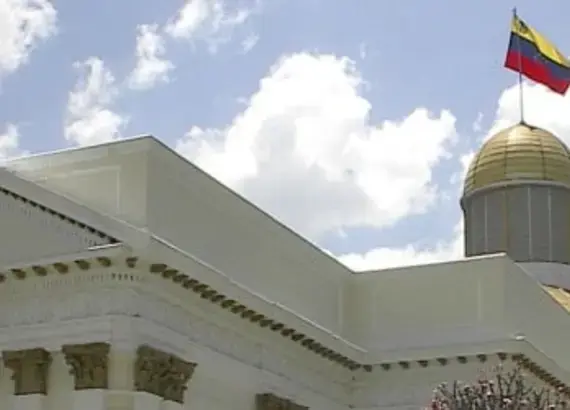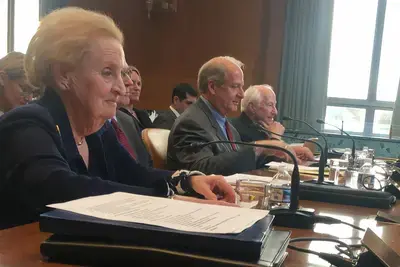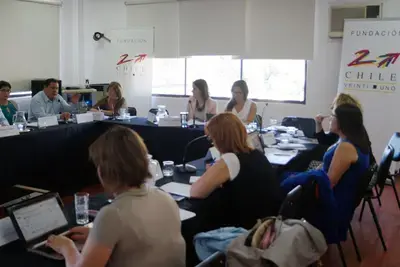
Success Story
A New National Assembly for Venezuela
Against the backdrop of a worsening economic crisis, Venezuelans went to the polls on December 6 to elect a new National Assembly. The government of President Nicolas Maduro experienced an unprecedented defeat as Venezuelans turned out in large numbers and voted decisively to put the country’s National Assembly under the control of the opposition coalition Democratic Unity Table (Mesa de Unidad Democrática, MUD) for the first time in seventeen years. In what was widely recognized as a positive step for Venezuela’s democratic process, President Maduro quickly conceded the loss on election night.
In a sharp rebuke to the PSUV and its current leadership, Venezuelans across the country, including in historic Chavista strongholds, voted the MUD alliance a “supermajority.” This two-thirds legislative majority with 112 of the Assembly’s 167 seats, formed by 109 MUD deputies in alliance with three indigenous legislators, provides the opposition a strong institutional platform to challenge PSUV’s dominance and press for reforms.
Prior to the elections, opinion polls showed the opposition MUD with a strong lead over the governing United Socialist Party of Venezuela (Partido Socialista Unido de Venezuela, PSUV). But after years of erosion of democratic practice, increasing authoritarianism and with the unchecked PSUV dominance of other government branches -- including nominally independent electoral authorities -- many Venezuelans and international observers doubted whether the opposition genuinely had sufficient voter support to overcome an electoral system widely criticised as unfair by both prominent international and Venezuelan experts in electoral law and human rights, including the OAS Secretary General, given the disqualification and even imprisonment of prominent opposition leaders, among other serious problems.
Contrary to pre-election fears, election day took place in a general atmosphere of calm and peace, with only isolated instances of violence or intimidation. Voter participation rates were exceptionally high for a legislative election, reaching 74 percent – almost as high as the 2013 presidential elections and far exceeding participation levels from the 2010 legislative elections. Although the CNE did not accept any international observers, they did accredit domestic observer groups including the Venezuelan Electoral Observatory (Observatorio Electoral Venezolano, OEV) and Education Assembly’s Electoral Observation Network (Red de Observación Electoral de la Asamblea de Educación, AE) two reputable civic organizations that are members of Lima Accord (Acuerdo de Lima), a regional network of election monitoring bodies that is an active member of the Global Network of Domestic Election Monitors (GNDEM). In fact, Acuerdo de Lima hosted its 2015 annual meeting in Caracas, and Acuerdo de Lima Venezuelan representatives attended the October 2015 GNDEM meeting in South Africa. Based on their observations, both groups issued statements after the elections in which they determined that the election day had concluded normally, with only minor irregularities that were not sufficient to impact the election’s outcome. The irregularities that were observed included the presence of government propaganda placed illegally close to polling stations and the CNE’s last-minute decision to keep polling stations open past the official closing time even when there were no voters in line. Additionally, some international groups sent informal assessment teams to analyze the pre-election environment and witness election day, including International IDEA and the Center for Electoral Advice and Promotion (Centro de Asesoría y Promoción Electoral, CAPEL) from the Costa Rican-based Inter-American Institute of Human Rights (Instituto Interamericano de Derechos Humanos, IIDH). International IDEA partnered with the third Venezuelan member of Acuerdo de Lima, the Catholic University Andres Bello (Universidad Catolica Andres Bello, UCAB) to issue a pre-election report analyzing the conditions in which the elections would take place and calling for electoral reforms. The CAPEL mission cited the same irregularities as the domestic groups, declaring that the presence of government propaganda and the CNE decision to keep the polls open served only to weaken voter confidence in the process.
On December 11, the MUD announced a legislative agenda to address the country’s economic and social challenges. Under the Venezuelan Constitution, the MUD-dominated National Assembly to be seated January 5 in theory will have substantial authority to pass reform legislation, propose constitutional amendments, exercise oversight over the executive branch, and nominate and impeach senior officials from the judiciary. This could also bring about reform of the executive, including measures that could trigger a referendum on whether to cut short President Maduro’s term. In practice, de facto PSUV control over the other government branches, including the judiciary, points to likely institutional conflict ahead.
Although many Venezuelans celebrated the opposition electoral victory, those advocating economic and democratic reforms face a long and challenging road ahead. The incoming National Assembly will likely face continued hostility and conflict with executive branch and potential challenges to its constitutional authority from the PSUV-dominated judiciary. At the same time, Venezuelans expect action from their elected leaders -- PSUV and opposition -- to ameliorate the country’s daunting economic and security challenges, including rampant inflation, chronic food and medicine shortages, and increasing levels of crime and violence. Indeed, many experts on Venezuela consider the December 6 vote less as an indication of support for the opposition and more as a rejection of the current government. As such, the opposition - which unexpectedly benefitted from the gerrymandered system to win 65 percent of the National Assembly seats with 56 percent of the popular vote - will have to work hard to prove to Venezuelans that it represents a viable political alternative and is capable of promoting positive changes for the country. Looking ahead, a key political development will be the outcome of elections for governor, which are slated for the end of 2016.
Prominent international figures, such as Kofi Annan, have called for dialogue between the Maduro government and the MUD. For its part, the PSUV government has no sign of interest in engaging the MUD in discussion of reforms to address the country’s most pressing issues. Instead, President Maduro and the outgoing National Assembly president Diosdado Cabello -- rumored to be appointed Vice President -- have announced the intention to undertake radical measures and are moving to reinforce PSUV control of the Supreme Court by filling vacancies in the weeks before the new National Assembly takes office.
While Venezuela’s polarized politics defies quick or easy solutions, Venezuelan voters have shown their voices count.
Published on December 16, 2015.



